The SSD Relapse: Understanding and Choosing the Best SSD
by Anand Lal Shimpi on August 30, 2009 12:00 AM EST- Posted in
- Storage
PCMark Vantage: Used Drive Performance
Immediately after finishing my PCMark Vantage runs on the previous page, I wrote one large file sequentially to the rest of the drive. I then deleted the file, rebooted and re-ran PCMark Vantage. This gives us an idea of the worst case desktop performance of these drives as you create, delete and generally just use these drives.

The biggest difference here is that the Samsung based OCZ Summit drops from 5th to 9th place. All of the drives get slower but the Indilinx drives hardly show it. When it comes to dealing with write speed, SLC flash does have the advantage and we see the X25-E and Vertex EX rise to the top of the pack. The G2 is slightly faster than the G1 and the Indilinx drives follow in close pursuit.
The mechanical drives don't change in performance since they don't get slower with use, only as they get more full.
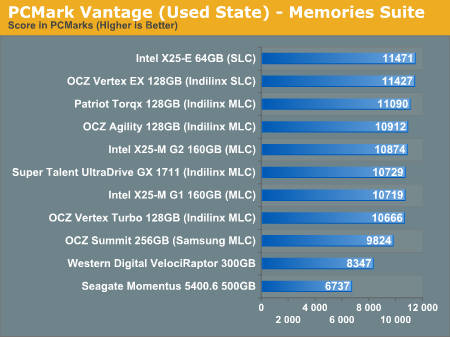
Again we see the two SLC drives at the top, this time followed by a mixture of Indilinx/Intel drives, and the Samsung based Summit is at the bottom of the pack before we get to the HDDs.
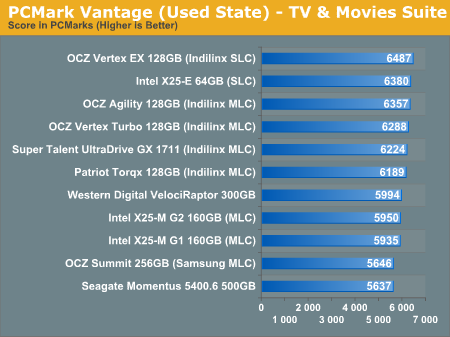
The spread in SSD performance here is only 10% between the slowest non-Samsung drive and the fastest. That tells me that we're mostly CPU bound, but the worst performers other than the Samsung drive are the two Intel X25-Ms. That part tells me that we're at least somewhat bound by sequential write speeds. Either way, the Indilinx drives have a good showing here.
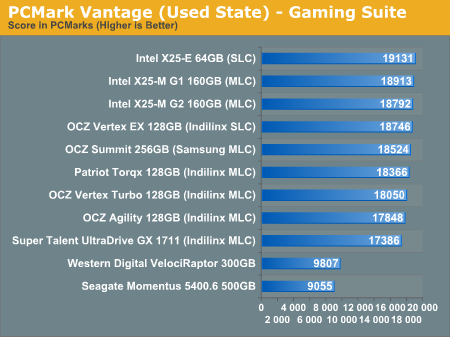
Intel followed by Indilinx SLC with Samsung in league with the MLC Indilinx drives. This is an SSD's dream.
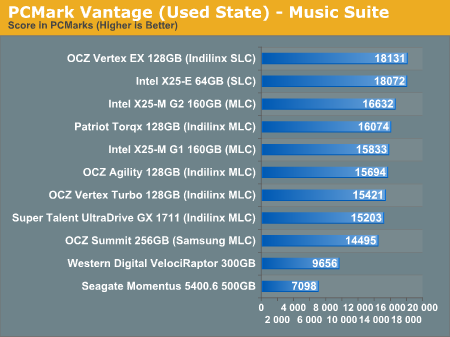
Despite the improvements, the G2 can't touch the much lower write latency of SLC flash here. The Indilinx and Intel G1 drives intermingle while the Samsung drive pulls up the rear. All are faster than a regular hard drive of course.
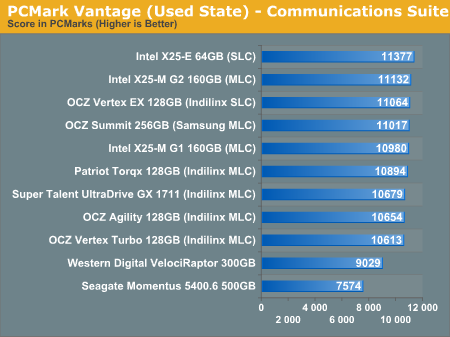
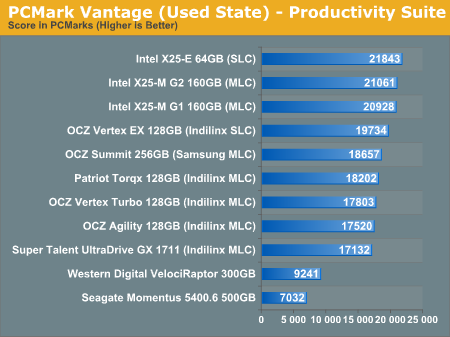
In the multitasking test we once again see Intel rise to the top. The Samsung drive does surprisingly well and the Indilinx drives continue to perform admirably.
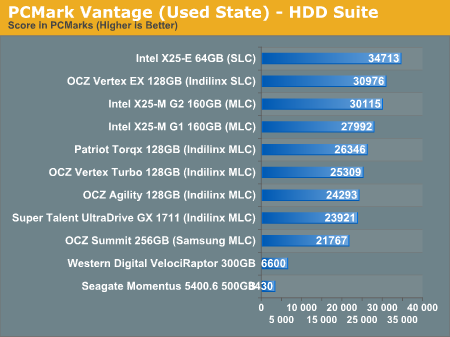
The breakdown between SSDs here is almost linear. The X25-E leads the pack, followed by OCZ's SLC drive. The G2 and G1 are next, then a ton of Indilinx MLC drives. The slowest SSD? The Samsung based Summit of course.










295 Comments
View All Comments
CList - Tuesday, September 1, 2009 - link
Don't be disgusted at Newegg, be disgusted at the people who are willing to pay the premium price! Newegg is simply playing a reactionary role in the course of natural free-market economics and cannot be blamed. The consumers, on the other hand, are willing participants and are choosing to pay those prices. When no one is left who is willing to pay those prices, Newegg will quickly lower them.Cheers,
CList
gfody - Tuesday, September 1, 2009 - link
I don't understand how consumers have any control over what Newegg is charging for the 160gb that's not even in stock yet.If Newegg wants to get the absolute most anyone is willing to pay for every piece of merchandise they may as well just move to an auction format.
DrLudvig - Tuesday, September 1, 2009 - link
Yeah, if you look at intel's website, http://www.intel.com/cd/channel/reseller/asmo-na/e...">http://www.intel.com/cd/channel/reselle...na/eng/p..., you will se that the R5 includes "3.5" desktop drive bay adapter to 2.5" SSD adapter bracket, screws, installation guide, and warranty documentation.Why on earth Newegg is charging that much more for it i really don't know, here in denmark the R5 retails for about 15 bucks more than the C1.. Which really isn't that bad..
Mr Perfect - Tuesday, September 1, 2009 - link
Whoa. That's it? An adapter kit? With that kind of price difference, I expected it to be the D0 stepping of SSDs or something.Thanks for clearing that up.
NA1NSXR - Monday, August 31, 2009 - link
The reason not being that performance or longevity is not good enough, but because improvements are still coming too quickly, and prices falling fast still. Once the frequency of significant improvements and price drops slow down, I will more seriously consider an SSD. I suppose it depends on how much waiting on the I/O you do though. For me, it is not so much that a Velociraptor is intolerable.bji - Tuesday, September 1, 2009 - link
Perhaps this is what you meant, but you should really clarify. It's still not time for YOU to buy an SSD. SSDs represent an incredible performance improvement that is well worth the money for many people.DragonReborn - Monday, August 31, 2009 - link
say i wanted to go crazy (it happens)...should i get two 80gb intel g2's or the 160gb intel g2? same space...is the RAID 0 performance worth it?i have all my important data backed on a big 2tb drive so the two ssd's (or 1 160gb) will just hold my OS/progs/etc.
thoughts?
kensiko - Monday, August 31, 2009 - link
I would say that in real world usage, you won't notice a huge difference between RAID and not RAID, SSD are already fast enough for the rest of the system. Also, TRIM may not work for now in RAID configuration.Just look at Windows Start up, no difference between Gen2 SSD!
Gc - Monday, August 31, 2009 - link
This is a nice article, but the numbers leave an open question.What is Samsung doing right? Multiprocess/multithread performance?
The article finds Samsung drives performance is low on 2MB reads,
(new 2MB sequential reads not given, assume same as 'used')
used 2MB sequential reads (low rank, 79% of top)
good on 2MB writes:
new 2MB sequential writes (middle rank, 89% of top)
used 2MB sequential writes (2nd place, 91% of top)
and horrible on 4KB random files:
(new 4KB random reads not given, assume same as 'used')
used 4KB random read (bottom ssd ranked, only 36% of top)
new 4KB random write (low rank, only 9% of top)
used 4KB random write (bottom ssd ranked, only 3% of top, < HD)
Yet somehow in the multitasking Productivity test and Gaming test, it was surprisingly competitive:
multitasking productivity (mid-high rank, 88% of top)
gaming (mid-high rank, 95% of top)
The productivity test is described as "four tasks going on at once, searching through Windows contacts, searching through Windows Mail, browsing multiple webpages in IE7 and loading applications". In other words, nearly all READS (except maybe for occasionally writing to disk new items for the browser history or cache).
The gaming test is described as "reading textures and loading level data", again nearly all READS.
Q. Given that the Samsung controller's 2MB read performance and
4KB read performance are both at the bottom of the pack, how
did it come out so high in the read-mostly productivity test
and gaming test?
Does this indicate the Samsung controllers might be better than Indilinx for multiprocess/multithreaded loads?
(The Futuremark pdf indicates Productivity 2 is the only test with 4 simultaneous tasks, and doesn't say whether the browser tabs load concurrently. The Gaming 2 test is multithreaded with up to 16 threads. [The Samsung controller also ranks well on the communications test, but that may be explained: Communications 1 includes encryption and decompression tasks where Samsung's good sequential write performance might shine.])
Since many notebooks/laptops are used primarily for multitasking productivity (students, "office"-work), maybe the Samsung was a reasonable choice for notebook/laptop OEMs. Also, in these uses the cpu and drive are idle much of the time, so the Samsung best rank on idle power looks good. (But inability to upgrade firmware is bad.)
(The article doesn't explain what the load was in the load drive test, though it says the power drops by half if the test is switched to random writes; maybe it was sequential writes for peak power consumption. It would have been helpful to see the power consumption rankings for read-mostly loads.)
Thanks!
rcocchiararo - Monday, August 31, 2009 - link
Your prices are way off, newegg is charging ludicrous ammounts right now :(also, the 128 agility was 269 last week, i was super exited, then it went back to 329, and its now 309.